TITLE:
Eukaryotic plankton in the pelagic system – biodiversity, biotoxicity and environmental impact
FUNDING:
National Recovery and Resilience Plan 2021-2026
ACRONYM:
BioPlan
DURATION:
2024-2027
Eukaryotic plankton in the pelagic system – biodiversity, biotoxicity and environmental impact (BioPlan)
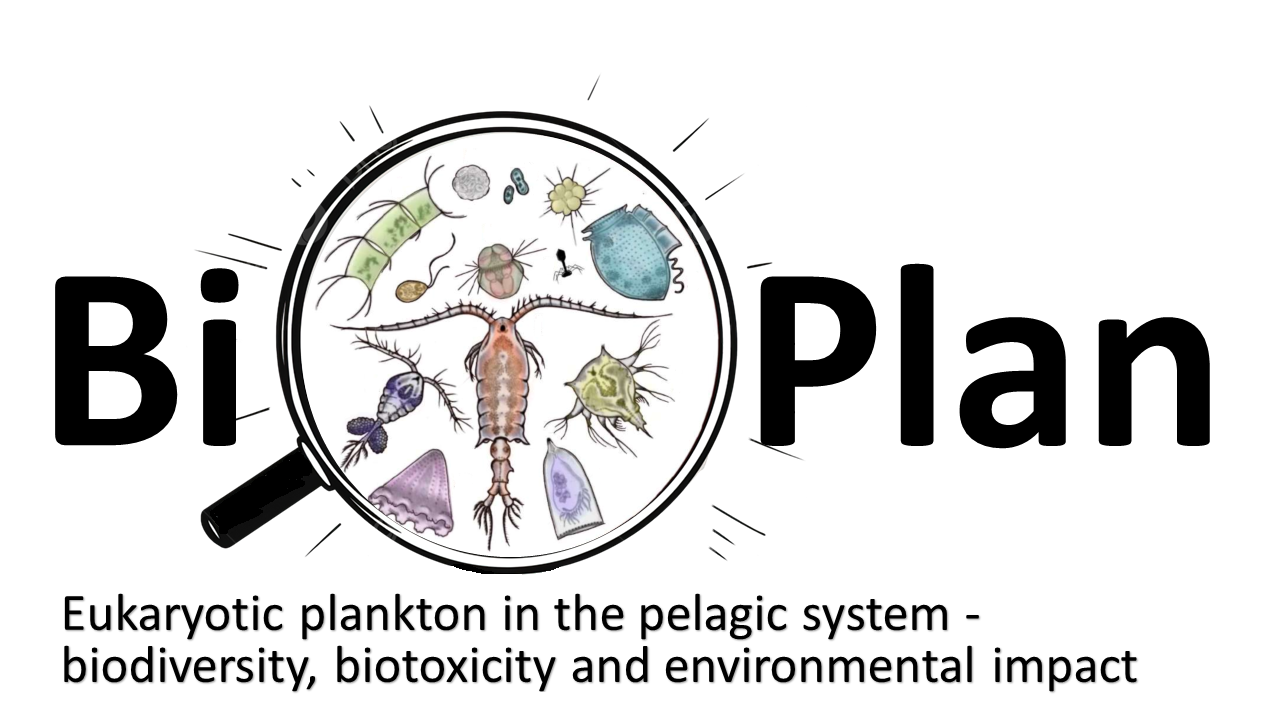
Eukaryotic marine plankton are now threatened by numerous harmful anthropogenic influences and global climate change, which affect the number of species and their natural cycles. The studies proposed within the BioPlan project aim to uncover interactions between these communities and climatic and anthropogenic environmental influences by identifying changes and trends in the number and structure of phyto- and zooplankton, their biodiversity, the frequency of occurrence of toxic blooms and the mechanisms of toxin production and bioaccumulation.
In addition to new results, we will also use the long-term data available at the Institute on the abundance and structure of phytoplankton and zooplankton to investigate climate-related patterns. We will study toxic phytoplankton species under natural and experimental conditions. Using integrative taxonomy, we will explore the potential of genomics in determining biodiversity indicators in a range of planktonic eukaryotes (photoautotrophs, heterotrophic/mixotrophic protists, multicellular heterotrophs) in the central Adriatic Sea.
By determining the chemical properties of natural lipophilic and hydrophilic toxins in marine organisms, we will investigate the process of bioaccumulation of toxins in natural and cultured bivalve species. The proposed research will contribute to the scientific knowledge of the planktonic communities of the Adriatic Sea, strengthen the scientific development of all scientists involved and of the institution itself, and enable the continuation of multidisciplinary scientific research even after the completion of this project.
Project team
Project logo

We would like to thank Dr Claudia Traboni for the use of the illustration in the design of the BioPlan project logo.
News
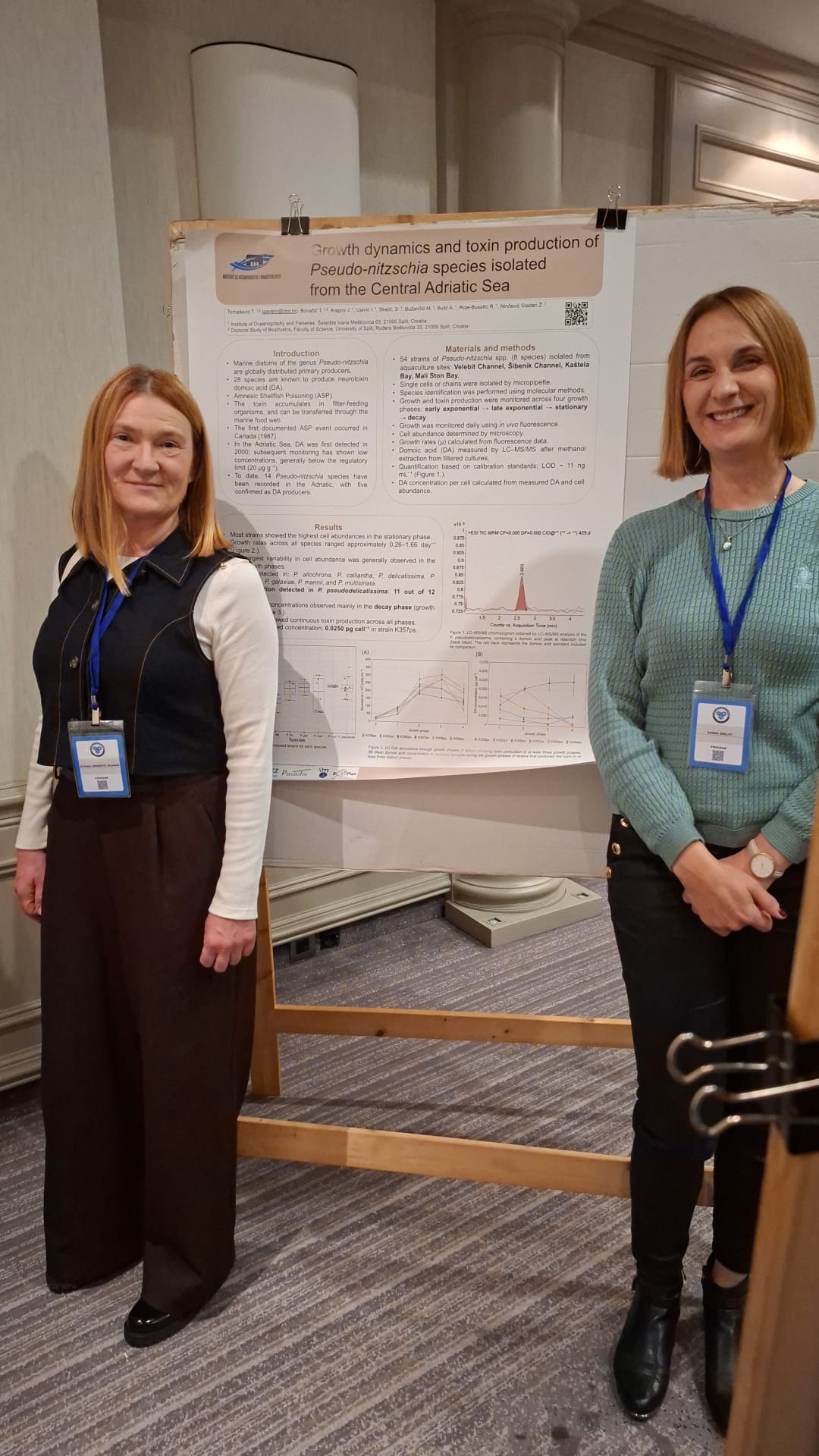
Participation in the Croatian Biological Congress
At the Croatian Biological Congress, held in November 2025 in Zagreb, researchers from the Institute participated with an poster presentation entitled: “Toxicity and growth dynamics of Pseudo-nitzschia species from shellfish farming areas in the Central Adriatic Sea” The authors of the presentation were: Tina Tomašević, Jasna Arapov, Tina Bonačić, Ivana Ujević, Sanda Skejić, Mia Bužančić, Antonija Bulić, Romana Roje-Busatto and Živana Ninčević Gladan. The presentation reported the results of a study focused on the analysis of growth rates and domoic acid production in different Pseudo-nitzschia species isolated from shellfish farming areas in the Central Adriatic Sea. Particular emphasis was placed on interspecific and intraspecific variability in toxicity, as well as on the relationship between toxin production and the growth phases of algal cultures. The research was conducted within the framework of the PSEUDOTOX project, funded by the Croatian Science Foundation (HRZZ), with additional support from the BioPlan project.
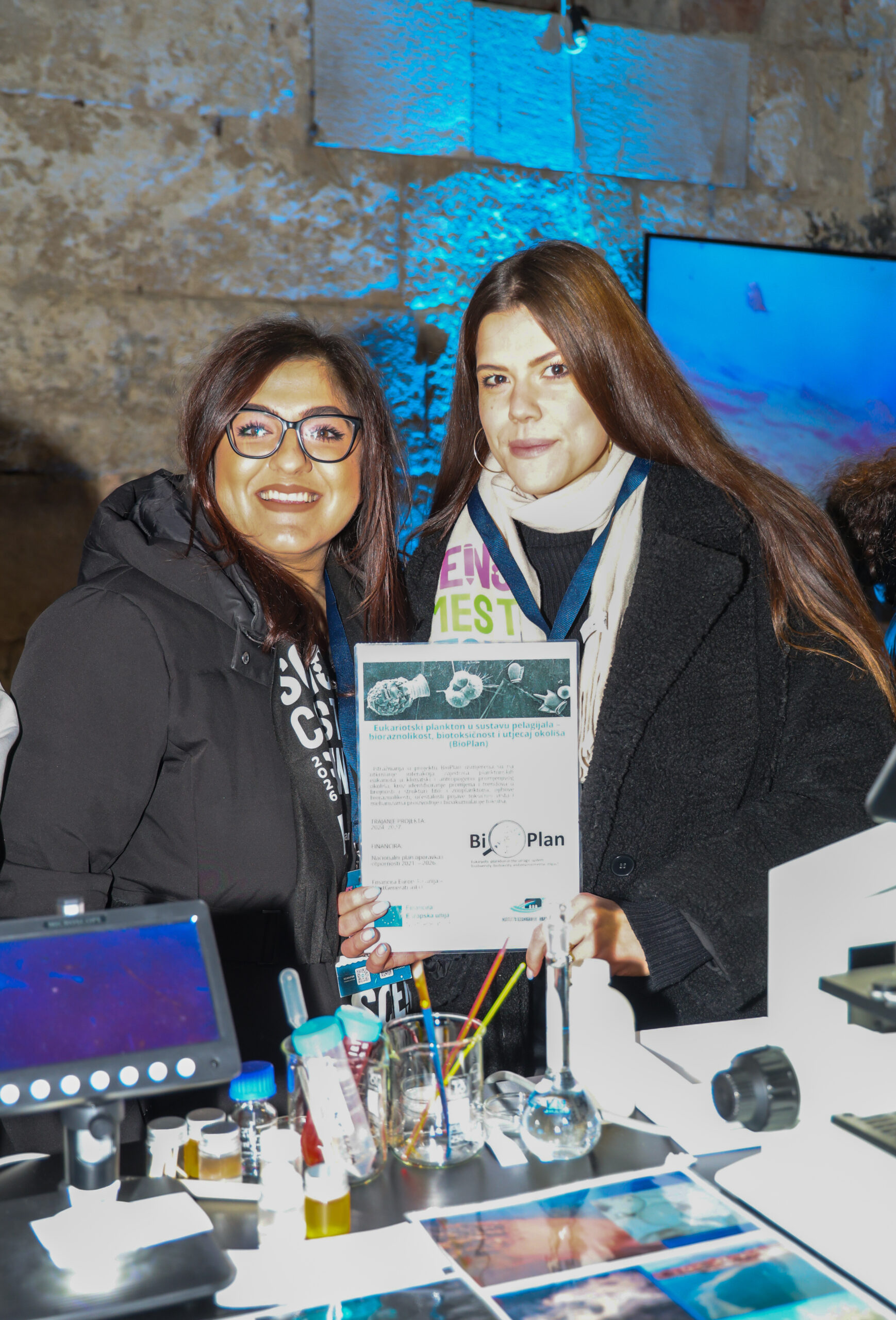
Science comes to town 2026
Scientists Dora Rabadan and Valjbone Rama participated in the project Science Comes to Town 2026, during which they presented and promoted the Bioplan project in Diocletian’s Cellars , with the aim of popularising science among the general public and children.
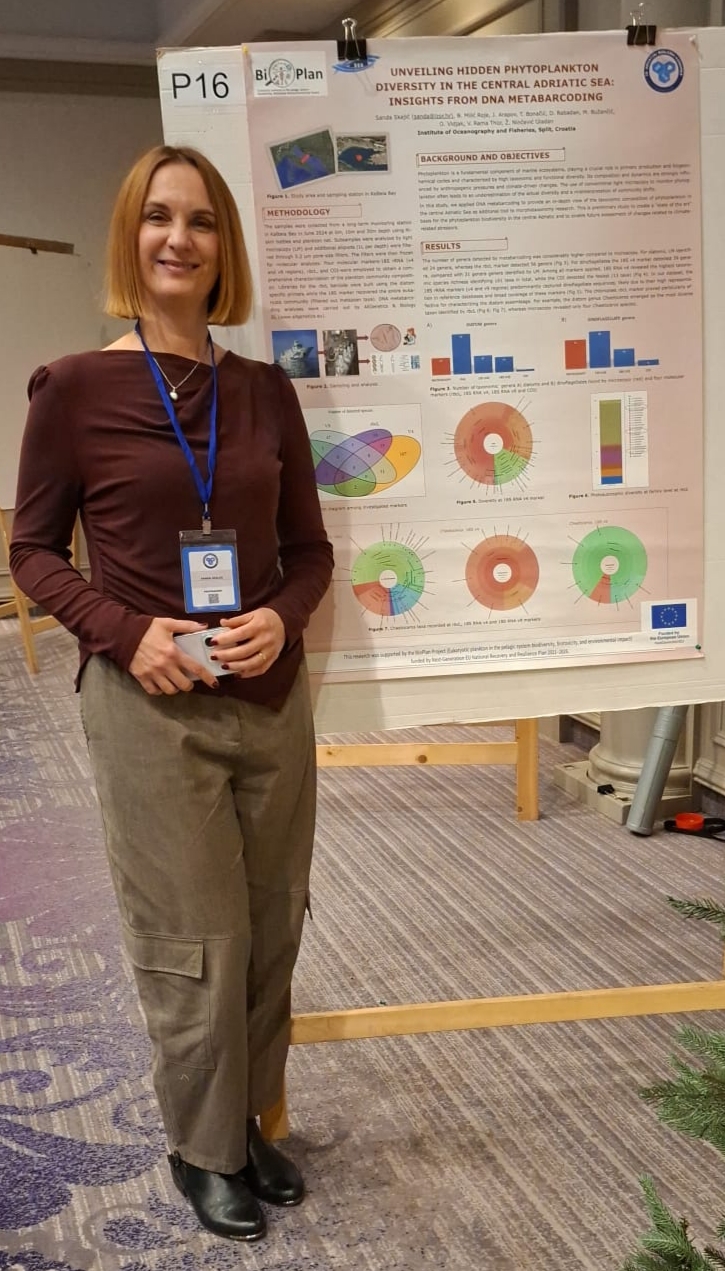
Preliminary Results of Phytoplankton DNA Metabarcoding in the Central Adriatic Sea
Preliminary results related to phytoplankton DNA metabarcoding obtained within the BioPlan project were presented at the Croatian Biological Congress held in Zagreb (20–23 November 2025). The aim of this study was to establish a “baseline state” of phytoplankton biodiversity and to enable future assessments of changes associated with climate-related stressors. The authors of the study are: S. Skejić, B. Milić Roje, J. Arapov, T. Bonačić, D. Rabadan, M. Bužančić, O. Vidjak, R. Valjbone, and Ž. Ninčević Gladan.
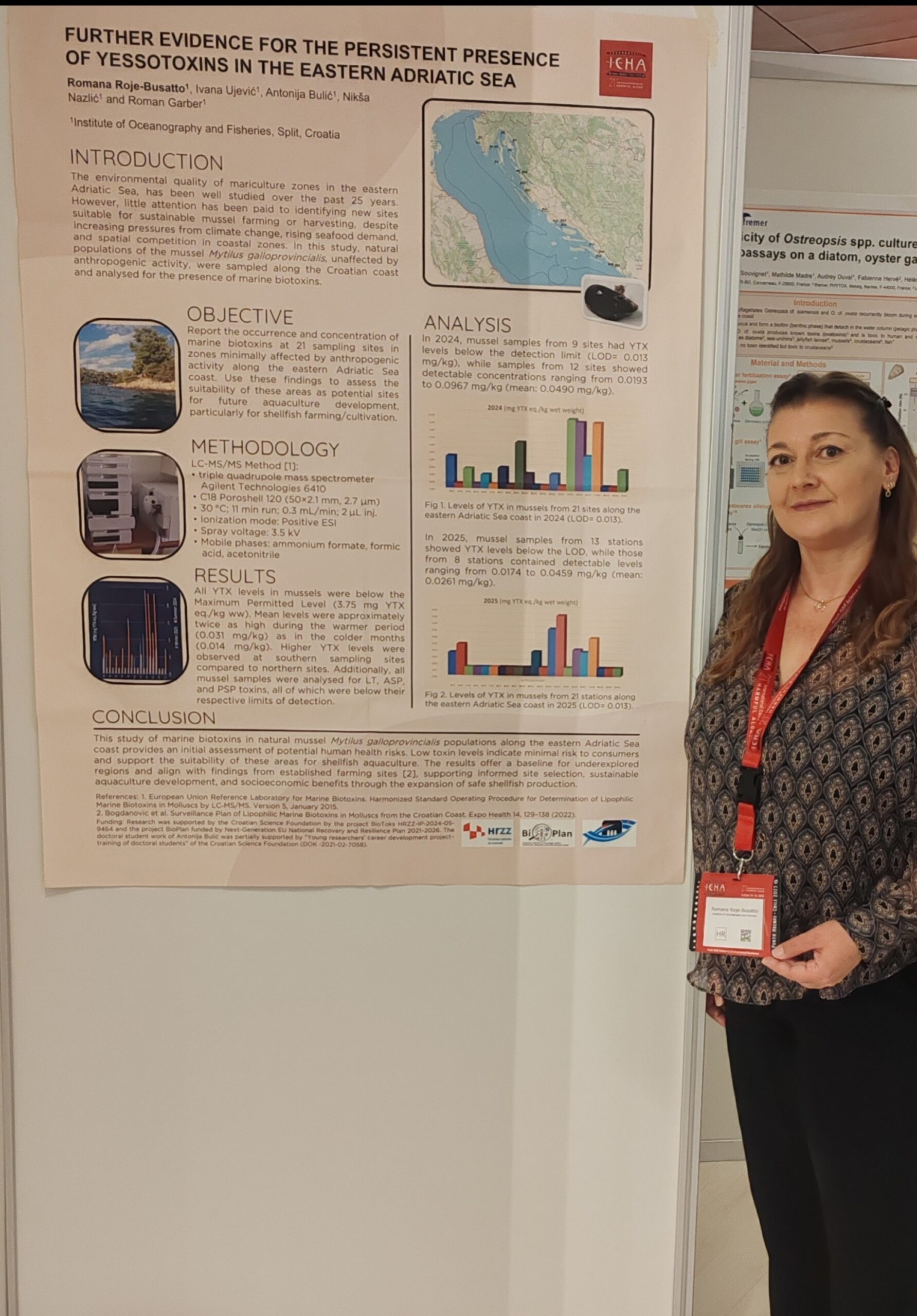
Contributing research at the leading global forum on harmful algae, ICHA2025
At the International Conference ICHA2025, held from 19 to 24 October 2025 in Punta Arenas, Chile, Dr. Romana Roje Busatto presented the results of a study assessing the quality of the marine environment in the coastal area of the Croatian Adriatic Sea to identify potential zones suitable for shellfish farming. The research was based on the analysis of natural populations of mussels (Mytilus galloprovincialis) as bioindicators of marine biotoxins and the presence of toxic phytoplankton species. The research team comprised: Romana Roje Busatto, Ivana Ujević, Antonija Bulić, Nikša Nazlić, and Roman Garber. More information is available at: link
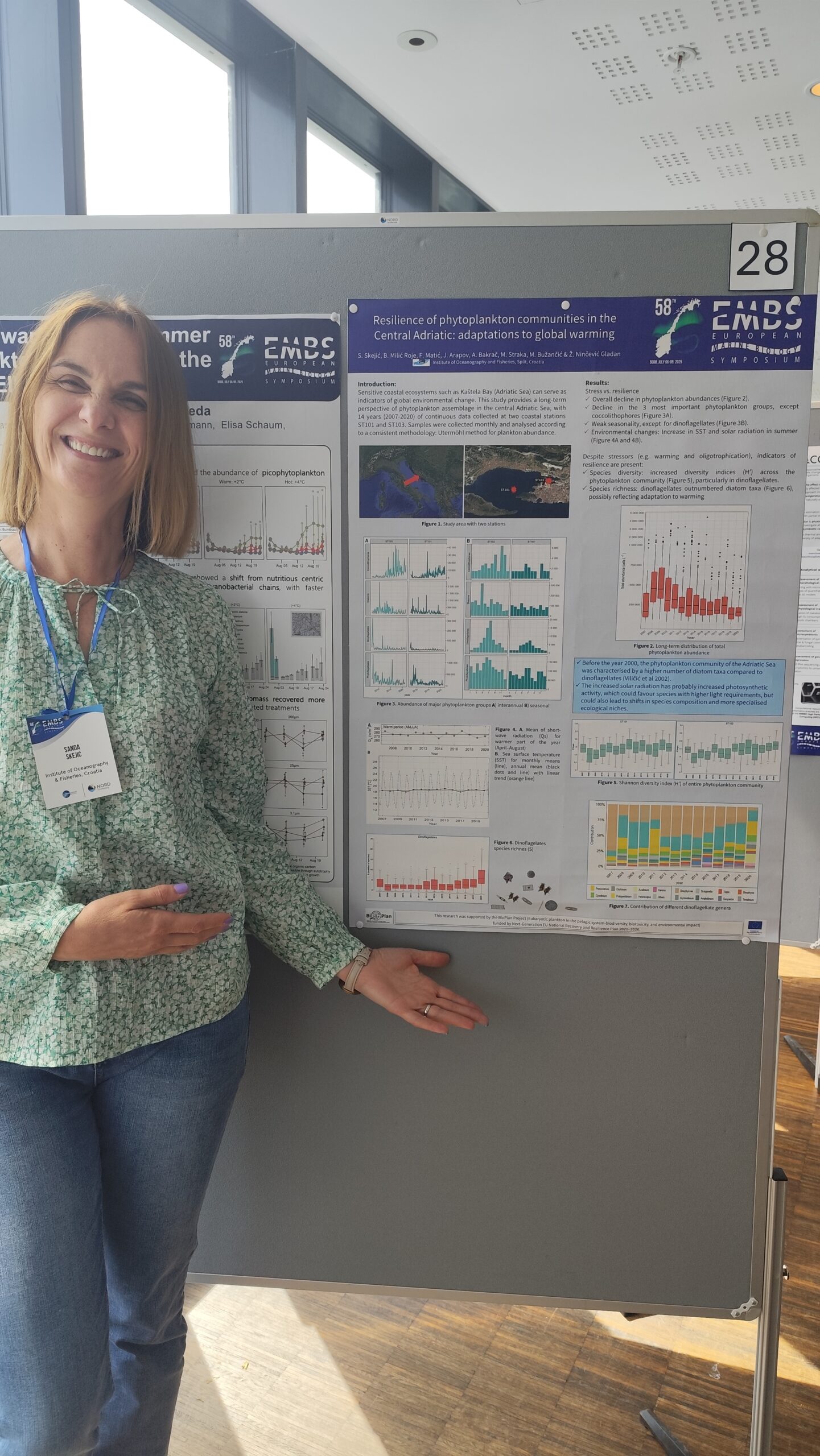
Findings from Long-Term Phytoplankton Community Research Presented at the 58th European Marine Biology Symposium (EMBS)
At the 58th European Marine Biology Symposium (EMBS 2025), held from July 6 to 9, 2025, in Bodø, Norway, results were presented from a long-term study on phytoplankton community composition trends in the Central Adriatic, conducted within the framework of the BioPlan project. The main objective was to identify patterns of change in community structure and resilience mechanisms of phytoplankton in response to global climate change. The study, entitled Resilience of Phytoplankton Communities in the Central Adriatic: Adaptations to Global Warming, was authored by S. Skejić, J. Arapov, B. Milić Roje, M. Bužančić, and Ž. Ninčević Gladan (Institute of Oceanography and Fisheries), F. Matić (University Department of Marine Studies, Split), and J. France (Marine Biology Station Piran, Slovenija).
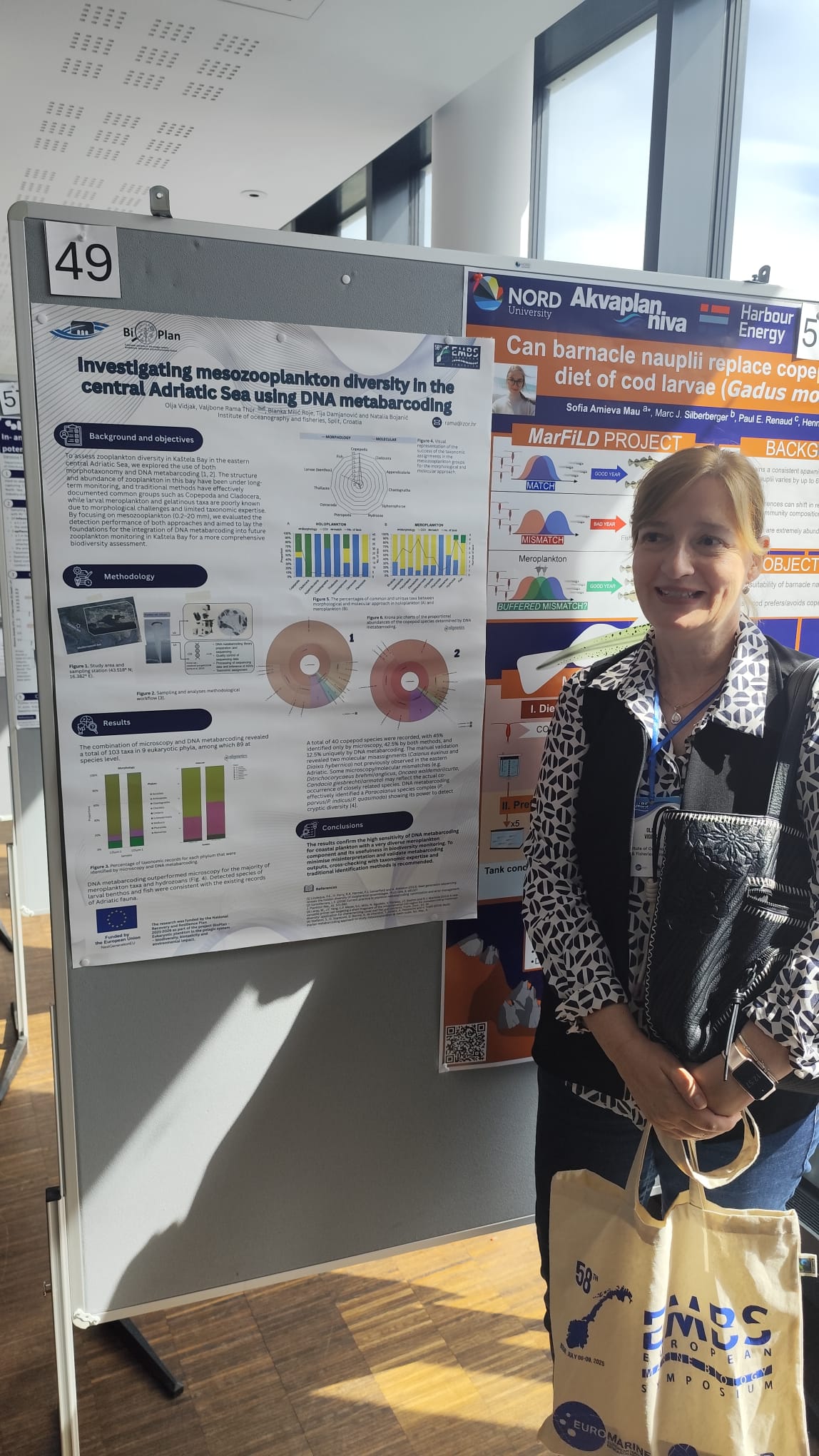
Presentation of zooplankton research from the BioPlan Project at the 58th European Marine Biology Symposium
A portion of the findings from the BioPlan project was presented at the 58th European Marine Biology Symposium (EMBS 2025), held from July 6 to 9, 2025, in Bodø, Norway. The research team—Olja Vidjak, Valjbone Rama Thür, Blanka Milić Roje, Tija Damjanović, and Natalia Bojanić—presented the first study of the zooplankton community in Kaštela Bay, employing an integrated approach that combined molecular techniques with classical morphotaxonomy. The primary objective of this research within the BioPlan project is to establish a foundation for incorporating DNA metabarcoding into zooplankton monitoring in the central Adriatic, enabling a more thorough assessment of marine biodiversity. The results demonstrated the high sensitivity of DNA metabarcoding in detecting coastal zooplankton diversity, particularly within the highly variable meroplankton component.
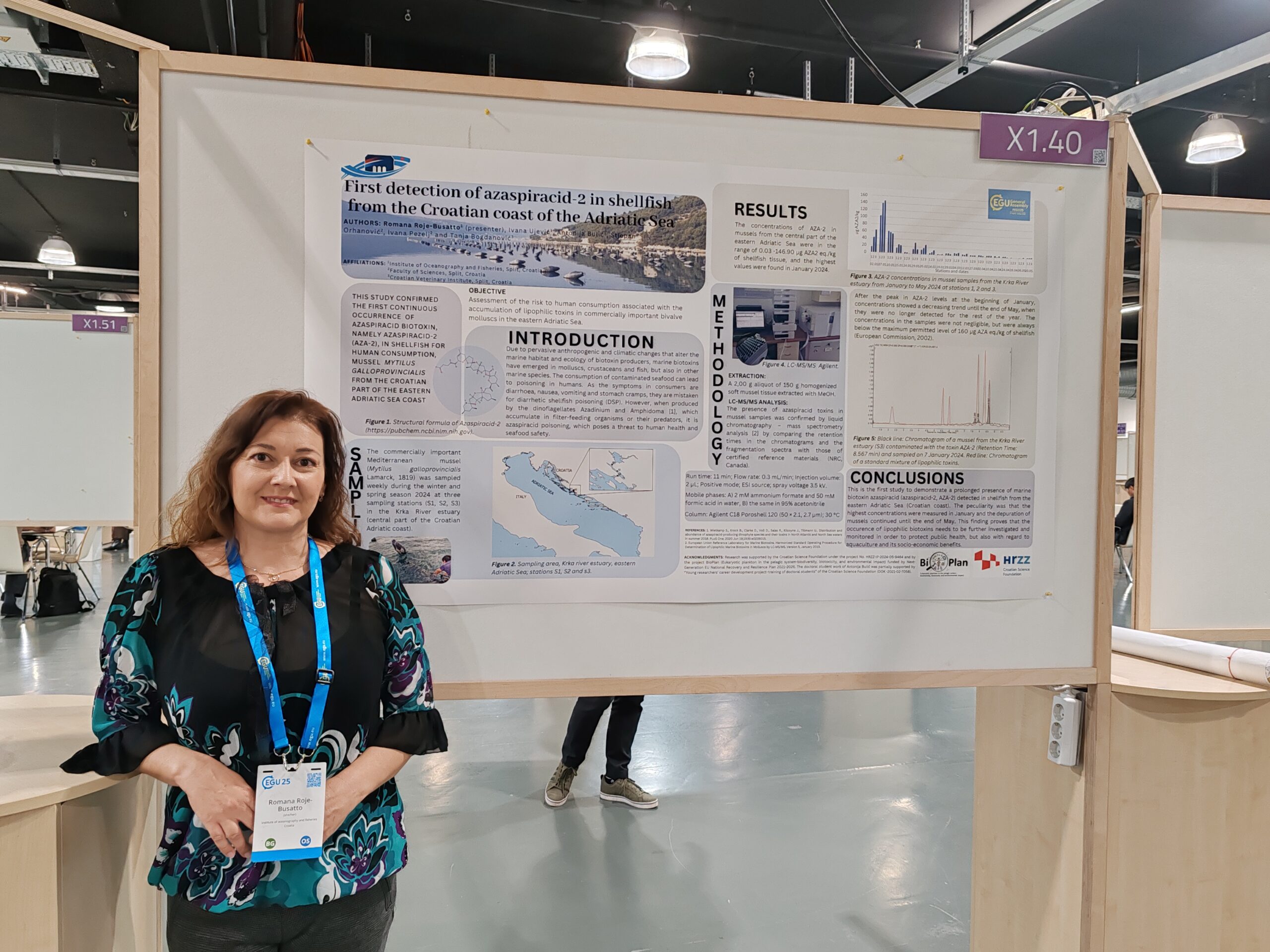
First detection of azaspiracid-2 in shellfish from the Croatian coast of the Adriatic Sea
At the international conference in Vienna, the EGU General Assembly (EGU25), Dr.Sc. Romana Roje Busatto gave a poster presentation entitled “First detection of azaspiracid-2 in shellfish from the Croatian coast of the Adriatic Sea”, which she co-authored with her colleagues Ivana Ujević, Antonija Bulić, Stjepan Orhanović, Ivana Pezelj and Tanja Bogdanović. More under the link.
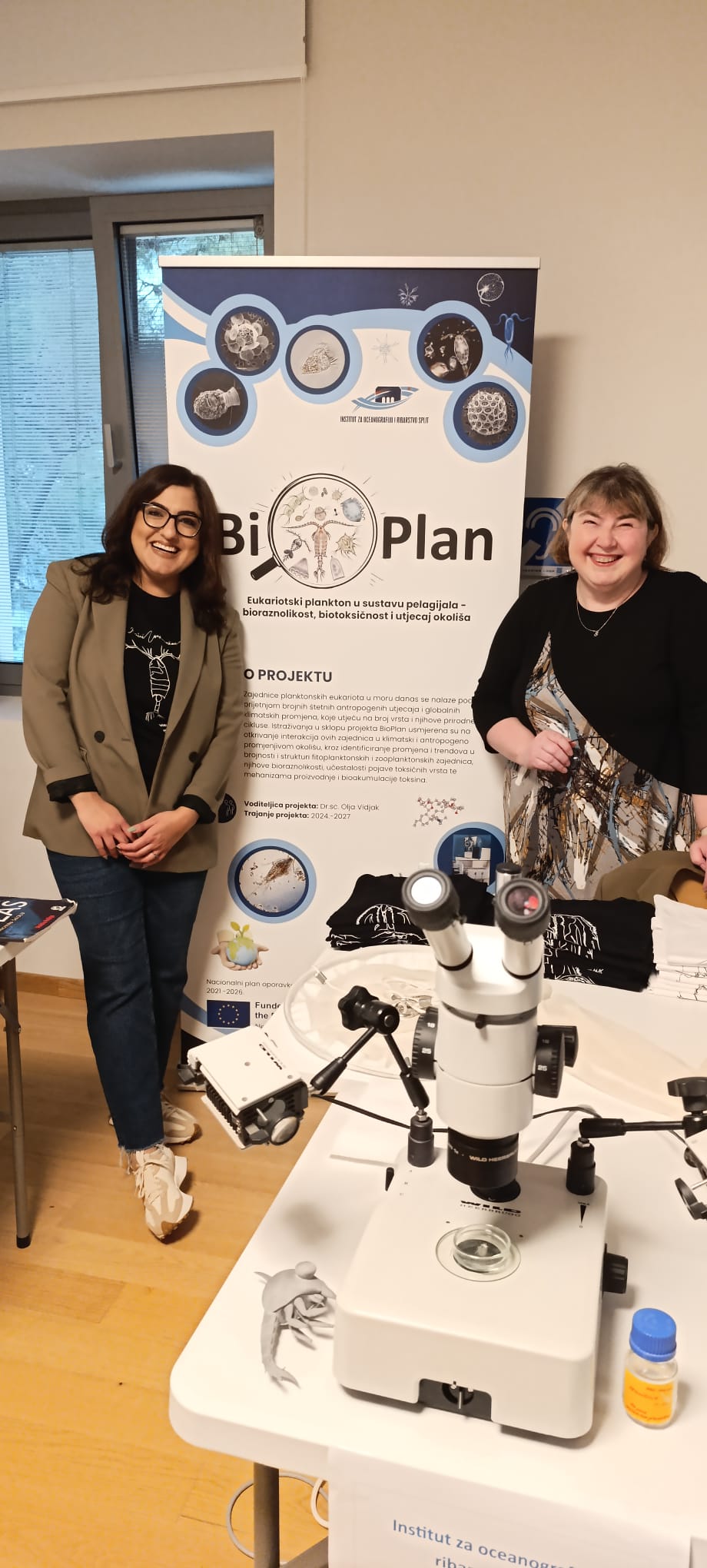
Presentation of the BioPlan project at the national Science Festival 2025
As part of the national Science Festival, the public event “How science began on my island” was held on May 6, 2025, organized by the public institution Nature of Šibenik-Knin County, Kanal Sv. Ante Visitor Center (available at the link). Members of the research team, Dr.sc. Natalia Bojanić and Valjbone Rama Thür, presented the research and results of the BioPlan project (National Recovery and Resilience Plan 2021-2026), with a special focus on the role of zooplankton in pelagic food webs and maintaining the health of marine ecosystems. This presentation was fully integrated into the concept of this year’s Science Festival with the theme “Nets”, which stands for the connection of people, ideas, technology, nature and knowledge. The event was attended by students and teachers from primary and secondary schools in Šibenik-Knin County, which opened up additional opportunities to popularize science and reach out to the local community. The event was opened by the Prefect of Šibenik-Knin County, Dr.sc. Marko Jelić, and the welcoming speech was given by the director of the public institution Nature, M.Sc. Anita Babačić Ajduk. The event was widely covered in the local and national media (morski.hr, sibenski.in, sibenskikanal.hr, mojadalmacija.com, dalmatinski portal, HRT). We would like to thank the staff of the Kanal Sv. Ante Visitor Center for their hospitality and exceptionally successful organization of the event and look forward to future cooperation on new projects.
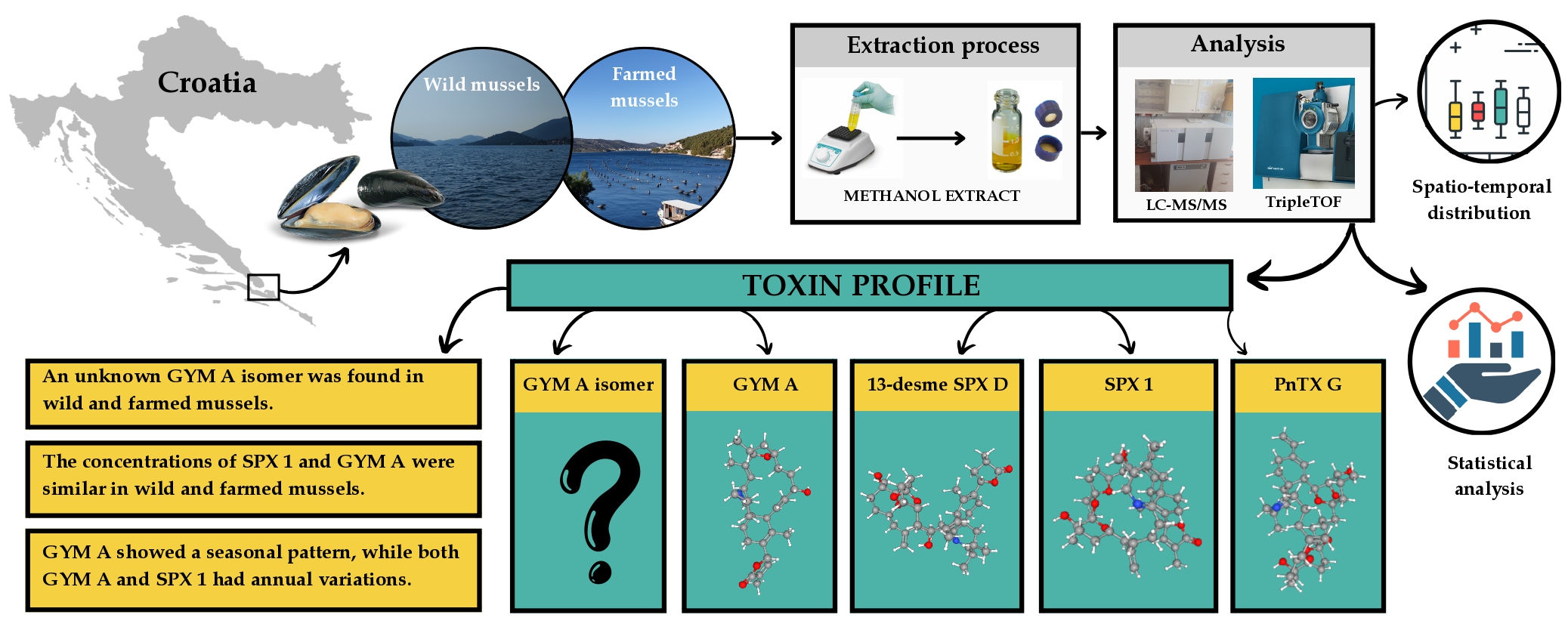
Paper published in journal Marine Pollution Bulletin
The Institute of Oceanography and Fisheries, in collaboration with the Faculty of Science Split, led by dr. sc. Ivana Ujević and dr. sc. Stjepan Orhanović, conducted the first systematic study of the presence of cyclic imines in shellfish from the southern Adriatic. By analyzing 126 mussel samples using the mass spectrometry method, 13-desmethylspirolide D, pinatoxin G and the isomer of gymnodimine A were detected for the first time in the southern Adriatic. You can find more about the research results at the link.
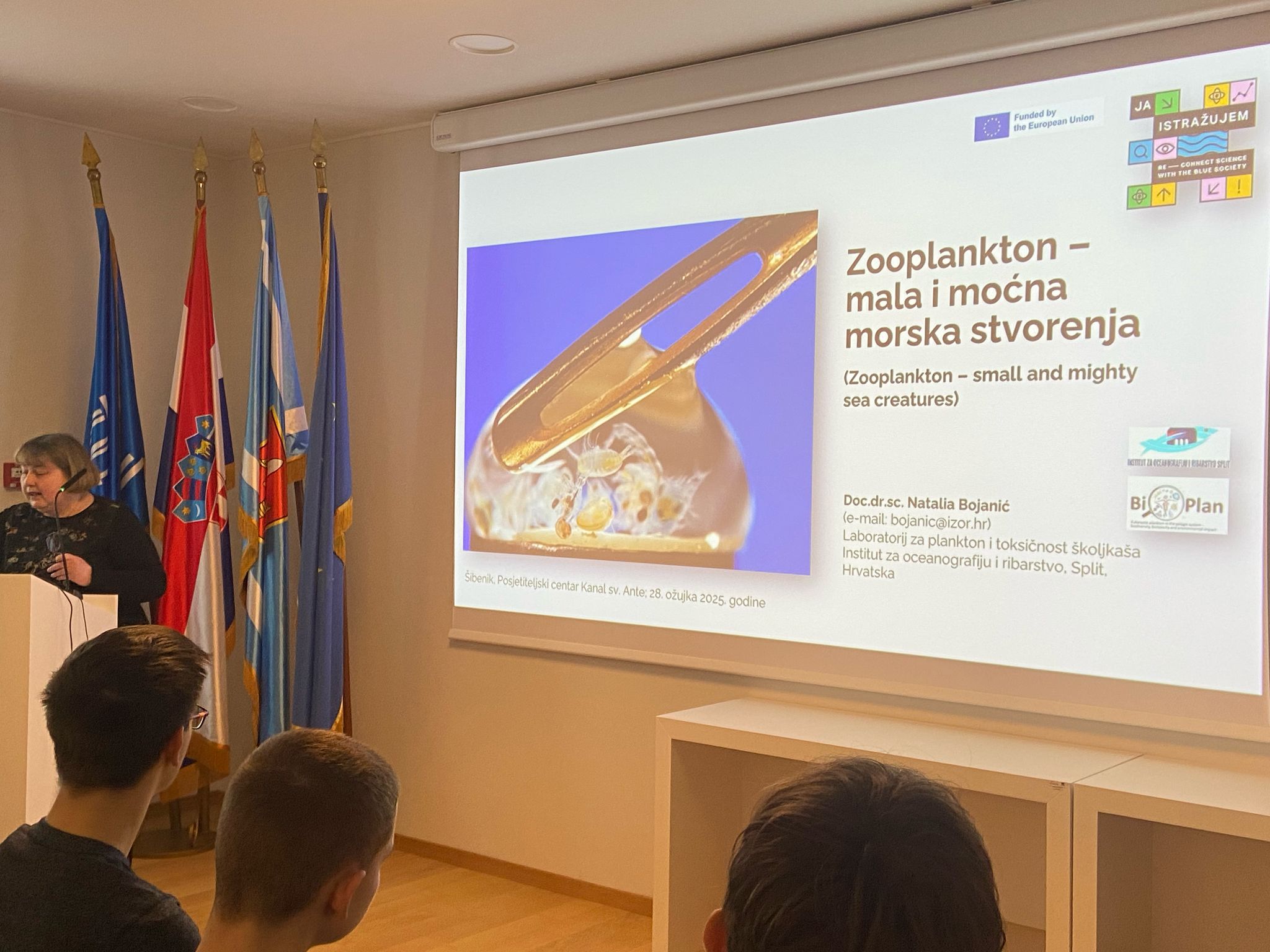
Popular science lecture “Zooplankton – small and mighty sea creatures”
Natalia Bojanić Ph.D, member of the research team of the BioPlan project, gave a lecture on March 28, 2025 as part of the project “Reconnect Science with the Blue Society (Blue-connect 2.0)” at the Public Institution Nature of Šibenik-Knin County, Visitor Center St. Anthony’s Channel (available via the link).The aim of the presentation was to introduce the public to the morphotaxonomy and ecology of the most important groups of eukaryotic zooplankton, from unicellular organisms such as ciliates, radiolarians and foraminifera to multicellular organisms such as rotifers, copepods, gelatinous zooplankton and meroplankton larvae. The latest plankton research carried out at the Institute of Oceanography and Fisheries as part of the BioPlan project (National Recovery and Resilience Plan 2021-2026) was also presented. Particular attention was paid to the importance of zooplankton in food webs, its role in the “biological pump” and its importance in assessing the health of marine ecosystems.
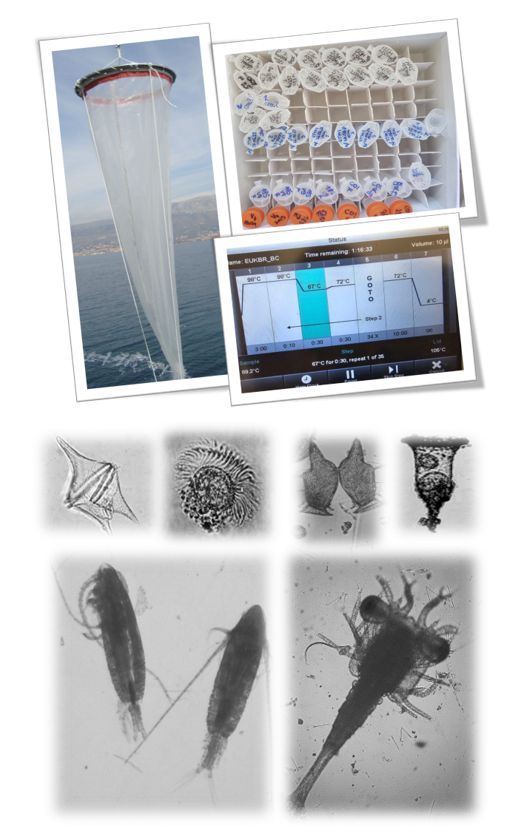
Investigation of the genetic diversity of plankton communities in the Bay of Kaštela
Marine planktonic eukaryotes are organisms with high morphological, phylogenetic and genetic diversity and include primary producers and consumers at the base of the marine food web. As part of the BioPlan project (National Recovery and Resilience Plan 2021-2026), we conducted a pilot sampling of planktonic communities in Kaštela Bay in June 2024. Samples of unicellular photoautotrophic organisms (phytoplankton), heterotrophic/mixotrophic protists (microzooplankton) and other multicellular heterotrophic organisms (mesozooplankton) were collected, whose isolated DNA will provide new insights into the genetic diversity of planktonic communities in this area.
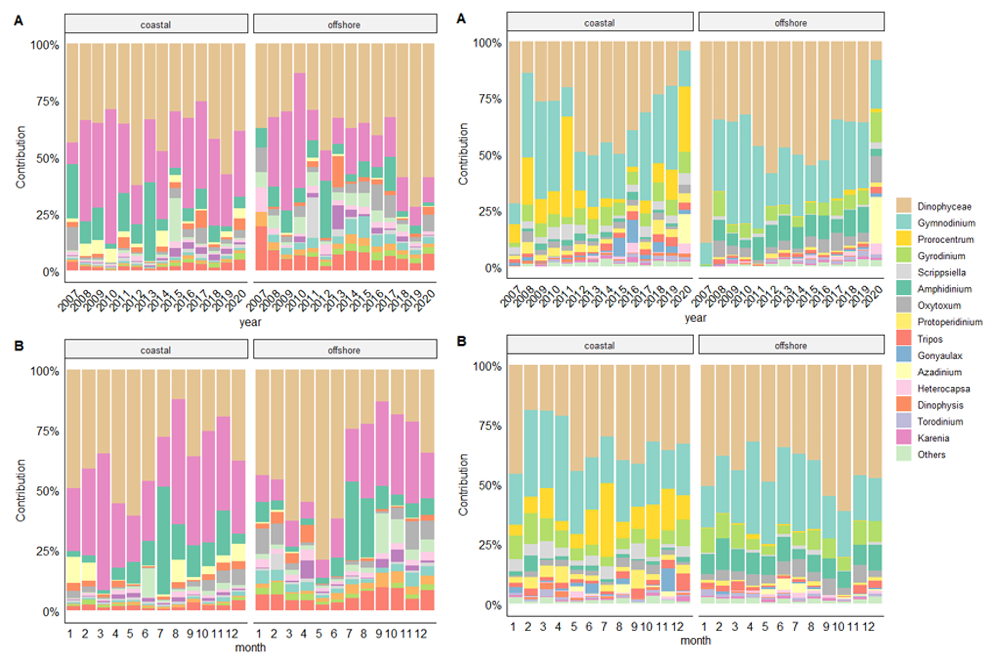
Paper published in journal Biology
As part of the project BioPlan – Eukaryotic Plankton in the Pelagic System – Biodiversity, Biotoxicity and Environmental Impact (National Recovery and Resilience Plan 2021 – 2026), Dr. Sc. Sanda Skejić and co-authors published the research paper “Phytoplankton Assemblage over a 14-Year Period in the Adriatic Sea: Patterns and Trends“, which is of exceptional importance for the study of phytoplankton communities in the Adriatic Sea. This study provides a rare long-term perspective of phytoplankton diversity and abundance in the central eastern Adriatic Sea, with 14 years of continuous time-series data collected in trophically diverse environments. The observed increase in diversity, especially in dinoflagellates, which outnumber diatoms, could be a possible adaptation of dinoflagellates to increased natural solar radiation in summer and increased sea surface temperature. The study was published in a special issue of the journal “Biology” dedicated to the effects of climate change on marine plankton. It was conducted in collaboration with colleagues from the University Department of Marine Studies in Split and the National Institute of Biology, Marine Biological Station Piran.
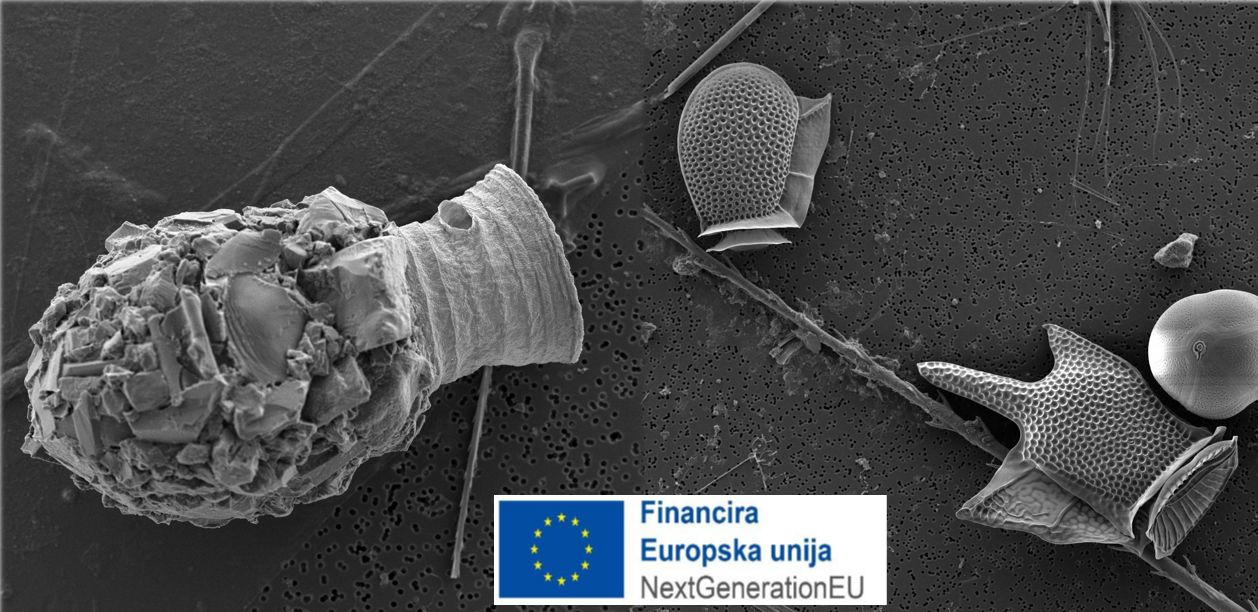
BioPlan project has begun
The implementation of the project „BioPlan – Eukaryotic plankton in the pelagic system – biodiversity, biotoxicity and environmental impact“ has started. The project is funded by the National Recovery and Resilience Plan 2021-2026 and will run for four years. On this page you can follow our activities and the progress of the project.

Financira Europska unija – NextGenerationEU. Izneseni stavovi i mišljenja samo su autorova i ne odražavaju nužno službena stajališta Europske unije ili Europske komisije. Ni Europska unija ni Europska komisija ne mogu se smatrati odgovornima za njih.